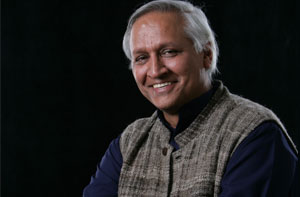
#GoodNews December: Highlights from Social Entrepreneurs in 2019
As the end of 2019 approaches, we’ve gathered up the good news: the progress and accomplishments of Skoll social entrepreneurs, hard at work on the world’s thorniest problems. We are…

The Barefoot College is a community-based grassroots organization founded by Sanjit ‘Bunker’ Roy working from Tilonia, Rajasthan since 1972 on the Gandhian concept of reaching the last person. It was established to harness the skills and intelligence of rural people and ‘specialists’ people with degrees and formal professional competence, to work together to empower local communities. The Barefoot College aimed to specifically address the issues concerning marginalized communities and individuals, including women, the exploited and the impoverished rural poor living on less than $3/day. The work took shape in practical domains like water, education, solar, health, advocacy, environment, communications and rural livelihoods including handicrafts. Barefoot has also sought to enable marginalized rural communities to participate in planning, executing, and maintaining their own frameworks for development. These processes have provided the opportunity to the rural poor to lift themselves out of relative poverty with dignity and self- respect. The Barefoot College discussed, defined and consolidated the non-negotiables within its body politic (equality, collective decision-making, decentralization, self-reliance, austerity and openness to learning skills). Barefoot College has been a place where sustainable ideas and the practical knowledge of the poor have been put into practice through work in education and skill development. This work has, in turn, resulted in large-scale impact in access to drinking water, rainwater harvesting, solar electrification, non- formal education, health, conservation, women’s empowerment and culture. Barefoot has effectively demonstrated the potential of giving the rural poor an opportunity and support to develop self-sufficiency by drawing upon a combination of traditional knowledge (symbolized by “barefoot”) and demystified modern skills
Barefoot College has been working towards sustainable development for over 50 years, and our mission is to empower marginalized communities and individuals by providing them the skills and knowledge they need to take control of their own futures. To further advance its mission, here are some ambitious goals: 1. Expansion of Barefoot College’s reach: We aim to expand our programmes in the areas of water, solar, education, health, livelihoods and environment by establishing partnerships with local organizations, governments, and philanthropic entities to provide our services to many more communities and more people in need. 2. Advancement of technology: Barefoot will continue the efforts to demystify technology to develop affordable, efficient and sustainable solutions. 3. Advocacy and policy reform: Barefoot College has been a strong advocate for policy reforms that support sustainable development and the needs of rural communities and shall continue to do so by lobbying governments, partnering with international organizations.
Barefoot College is committed to making a sustainable and positive impact on the communities it serves, by working in a collaborative and systemic approach. The organization partners with civil society, communities, governments, private sector, and multilateral organizations to drive localized sustainability, policy change, and comprehensive positive impact in various thematic areas driving positive change. In the process, we build the capacity of the community and develop sustainable and knowledge frameworks to create a long-lasting impact

As a young post-graduate student from a privileged urban background, Bunker Roy volunteered to spend the summer working with famine affected people in Bihar, one of India’s poorest states. This experience changed him. He committed himself to fight poverty and inequality. He founded the Barefoot College in Tilonia (also known as Social Work and Research Centre) in 1972 to bridge the inequality gap and demystify technology with the people and put it to good use in the hands of poor communities. This radically simple approach to ending poverty, by tapping the wisdom, skills, and resourcefulness of the poor themselves, is less expensive and more successful than approaches that rely on external experts. Barefoot College recruits illiterate villagers and trains them to build and maintain life-changing technologies and systems such as solar electricity, water and sanitation, schools and clinics, artisan businesses, and community engagement.